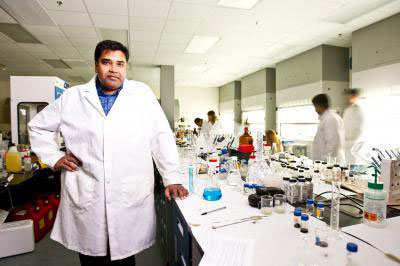| Posted: August 5, 2010 |
Power plant waste to be used to clean up Gulf oil spill |
|
(Nanowerk News) Specially treated waste material from electric power plants will soon be used to clean up oil in the Gulf thanks to the ingenuity of a University of Central Florida professor.
|
|
The National Science Foundation awarded Sudipta Seal a $67,000 grant that will help the professor turn waste material, commonly referred to as flyash, into a cleaning agent. Seal will modify the flyash so that it absorbs oil and can be delivered to a coal-burning facility and re-used.
|
 |
| Professor Sudipta Seal works in his lab at the University of Central Florida.
|
|
The flyash will be safe, preserve the oil's energy-generating capabilities and be reusable once the oil is burned off.
|
|
"It's a completely green process very cost effective and easy to scale up," said Seal, who has been studying the characteristics of flyash for more than a decade as part of his research on rare earth nanoparticles.
|
|
Seal is director of UCF's Advanced Materials Processing and Analysis and NanoScience Technology Centers and a professor of mechanical, materials and aerospace engineering.
|
|
Larry Hench, a renowned ceramic materials professor who conducts special projects for UCF, will work with Seal to develop the flyash and prepare a process for deployment that can then be licensed to a commercial partner.
|
|
They envision that the flyash will be retrieved from the water in a low-cost mesh packaging material and then transported to a coal-burning power plant or other facility where the oil will fuel production processes.
|
|
The flyash has also shown the ability to clump oil that has already washed up on shore, enabling it to be easily collected and, again, re-used.
|
|
Since the Deepwater Horizon spill began in April, NSF has funded 65 of the rapid response grants to researchers across the country addressing all aspects of the clean-up.
|
|
The grants are deployed in times of natural or accidental disasters to quickly engage the world's best scientists and engineers to help search for solutions.
|

